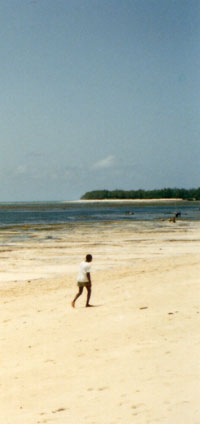Sabaki kiboko

North of the pier and the Vasco da Gama monument, Malindi's beach stretched in a slow curve that I could never cover in an afternoon's walk. Soon I was out of sight of the Post Office radio mast, and passing the last hotels - the Sindbad and the Eden Roc. Here a couple of tourists gambolled in the surf. A feisty peroxide blonde fraulein in a miniscule leopardskin bikini waved and called hello. Distant dots proved to be naked Europeans, congregated at a rickety thatched sun shade. A mahogany brown, grizzle-haired Italian-looking man wearing sunglasses and gold jewellery signalled that I really ought to discard my flowery surfing shorts.
Soon there was noone visible on the white strand before me, that might stretch to Somalia. I decided to go as far as I could, leaving time to return to town before dusk. There were no great steaming rollers for surfing. The waves from the reef ran up a shelving beach and curled up only briefly before tumbling down. It was nonetheless exhilarating to let the tumult break round you and body surf a few meters at a time. The bottom was smooth, and there was no weed in the water though it was slightly turbid because of churning sand. The sea left the sand firm and cool and filled with flecks of gold.
How would a shipwrecked sailor have felt, washed up on this apparently endless and desolate strip. How would he survive, unaware of the Eden Roc snack bar? Maybe by catching the ghost crabs that swarmed in translucent drifts ahead. But their flight distance was about ten meters, so he would have to dig them out of their burrows. Shore birds scooted about at the tideline, flying out over the surf and around behind me as I passed. Others, strong flyers, bowled in tight flocks down the gusting wind. There were plovers and curlews or whimbrels,and sand pipers.
Gradually an interruption took form ahead. It looked like the mouth of a river. I decided to walk up to it and then turn for civilisation. It was a system of flats and bars with slow channels carved through the sand; and a still lagoon. The scene might be remoulded by every tide that scoured and battered the sands, or every rainy season that sent down sediment from the hinterland.
In the heat the light was shimmering on the flats where the river met the sea, and with a shock I realised that there was a flock of birds standing out there. They were flamingoes in hundreds, bright pink, with some paler or white juveniles. It seemed wrong to see them here. They were feeding close to the surf and as I approached the nearest took off, wheeling to alight further from me. The action spread back through the crowd like a Mexican wave. To avoid alarming the flock I moved up the beach into the dunes and out of sight before turning for home. The scenery was immediately different - dry granular white sand, corrugated by the wind into creases like sidewinder tracks. The sun was at my back and the only sound was the wind. It was a miniature skeleton coast. I could be the first person in a dreamtime, plodding over a burning ancient seabed.
Then again, high tide mark was attended by the plastic trash that reaches every beach on earth: slings from packs of beer, detergent bottles, lumps of polystyrene. Timber planks with rusted nails sticking out somehow seemed more acceptable than the plastic. There was natural debris, too: failed coconuts like shrunken heads, even complete palm stems with their club-like root balls.
I padded a hundred meters back to the surf to cool my feet. The sun had sunk too far for worship and the naked Italians had gone. As I drew level with the hotels I met some children carrying plastic pails. They were digging out of the beach small shellfish, which they detected by bubbles in the receding water - perhaps they were bait for fishermen or for sale to restaurateurs. Soon I spotted the top of the radio mast and adjusted my course for the Post Office.
On my next visit to the beach, I saw something stranger than the flamingoes. There was a man fishing in the main channel that flowed to the sea. He was checking his netline, water up to his chin. I looked to the seaward end of the channel where the flamingoes had been. In the surf, like a nodding dog, was a hippopotamus. I waved to the fisherman and gestured towards the animal, shouting, "Have you seen that hippo?" He laughed and said that he knew where it was, no problem. A hippo at the beach, enjoying the foam burbling about its chops. Weird.